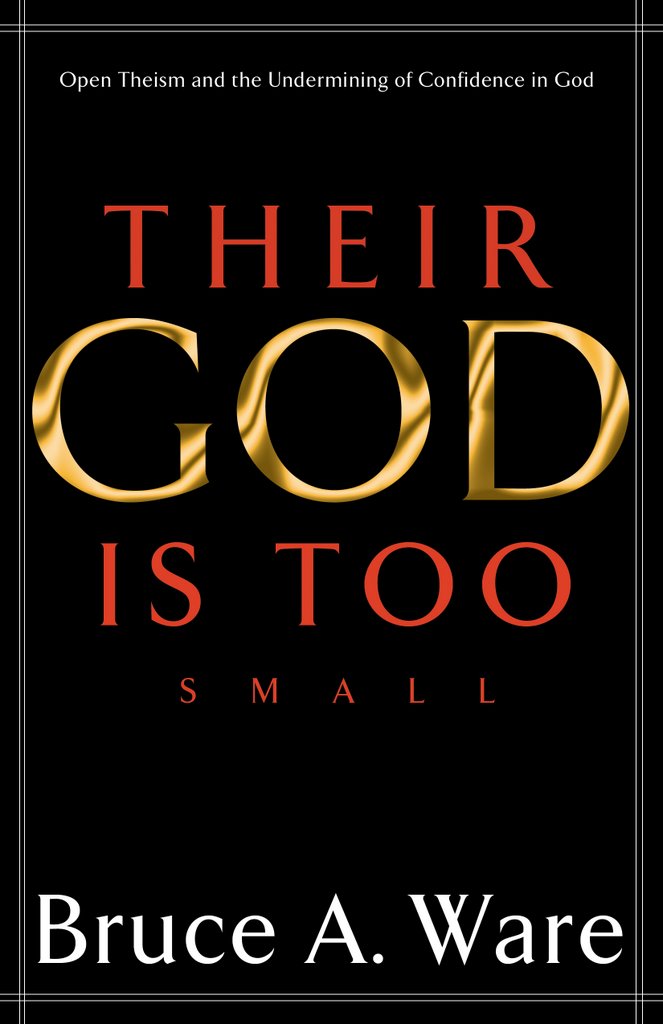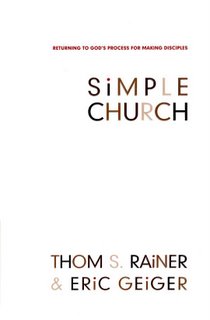Book Review - Their God is Too Small by Bruce Ware

Their God is Too Small: Open Theism and the Undermining of Confidence in God
Bruce A. Ware
Crossway Books, 2003
Category: Theology / Contemporary Issues
ISBN: 1581344813
Paperback
129 pages plus General Index and Scriptural Index
$10.99 MSRP
Although I have been a Christian now for almost twelve years, it was not until these last five years that I have really begun to develop spiritually. I thank the Lord for His sovereignty and for His infinite wisdom and planning that moved me half way around the country to get me to the point where He wanted me to be. It was at this point in Birmingham that He led me to a Bible-believing, Christ-honoring church, friends who feared the Lord, and a place where I eventually met my wonderful wife. This is a right and God-glorifying response to His activity in my life. However, according to the “Open View” of God (also known as Open Theism), I should not thank God for these occurrences of events, for He was just as surprised as I was to see how things have turned out. The Open View of God is the belief that God does not know the future, nor can He predict it. Instead, He watched history unfold with his limited involvement in divine initiatives (unless prompted by a human to do so). We ought not to think this way, and our brothers and sisters who do have done so to their own detriment as they serve a deflated and powerless God.
Bruce Ware serves as the Senior Associate Dean of Theology at the Southern Baptist Theological Seminary in Louisville, KY and is revered as an expert in the area of God’s sovereignty. I had the opportunity to hear Dr. Ware speak at the Living Truth Conference hosted by Hunter Street in September (Order Audio CD's Here), and I was impressed first by his humility and second by his apparent grasp of God’s sovereignty and its interaction with man. During this time, Dr. Ware defined God’s sovereignty as this: “God plans and carries out His perfect will as He alone knows best, over all that is in Heaven and earth, and He does so without fault or regret or defect.” I had purchased Their God is Too Small before the conference, but it was not until the conference’s end that I realized my great need to read this book.
In somewhat of a twist, I would like to quote from the conclusion of this book in order to set the stage for what is to follow. Dr. Ware is quoting AW Tozer from his book, The Knowledge of the Holy (New York: Harper & Row, 1961. 11-12) when he writes,“The essence of idolatry is the entertainment of thoughts about God that are
unworthy of Him. It begins in the mind and may be present where no overt act of
worship has taken place…So necessary to the Church is a lofty concept of God
that when that concept in any measure declines, the Church with her worship and
her moral standards declines along with it. The first step down for any church
is taken when it surrenders its high opinion of God.”
Thus is the reason why it is so important for us to think rightly and highly of God. Dr. Ware is clear to point out that those subscribing to the Open View, simply create a god in their own image who is more human, and more manageable. According to Ware, we are to be concerned with the new wave of open theists because “first, the very greatness, goodness, and glory of God are undermined by the open view of God” and “second, the strength, well-being, faith, hope, and confidence of Christian people in and through their God are undermined by the open view” (17, 19). Dr. Ware then begins to examine the Open Theist’s arguments of God’s Foreknowledge, Suffering, Prayer, and Hope with a chapter devoted to each in this short work.
What I appreciate most about Their God is Too Small is Dr. Ware’s use of scripture as the basis for all of his arguments. He does not delve too deeply into all of the philosophical questions and that lie behind this worldview, but rather he attacks it head on from the supreme source of all authority – the Scriptures themselves. In light of an elementary understanding of the Scriptures, I am still puzzled as to how Open View proponents bolster their arguments. And according to their view, neither does God.
I was encouraged by Dr. Ware’s arguments the Christian who prays to a sovereign God may have much more confidence in his prayer life than can the one who holds the open view. According to the Open View, “for the sake of dynamic and real relationship with God, and to underscore the authenticity of prayer that really matters...we must move from any model in which God knows in advance all that we will ask or think” (88). According to one proponent of the Open View, Greg Boyd, through prayer, “[God] graciously grants us the ability to significantly affect Him…He enlists our input, not because He needs it, but because He desires to have an authentic, dynamic relationship with us as real, empowered persons” (88). This makes me want to vomit.
Contrast this view of prayer with that of Christ Jesus Himself when He gave His disciples the model prayer: “Our Father in Heaven, hallowed be Your name. Your kingdom come, Your will be done, on earth as it is in Heaven” (Mat 6:10). Apparently Christ believed that the Father had a perfect will that was pleasing in His sight and best for all creatures. Dr. Ware asks us then, “Whom should I believe: Jesus, or John Sanders?” (90).
Well, Dr. Ware, I think you would be right in choosing Jesus. The Open View of God offers no hope in suffering, no confidence in prayer, and no hope for a future because this small god has no capability of knowing, predicting, or affecting the future. Those who worship the god of the Open View, worship a god who is limited, man-made, and completely un-scriptural. I heartily agree with Dr. Ware in stating that, indeed, their god is too small!











